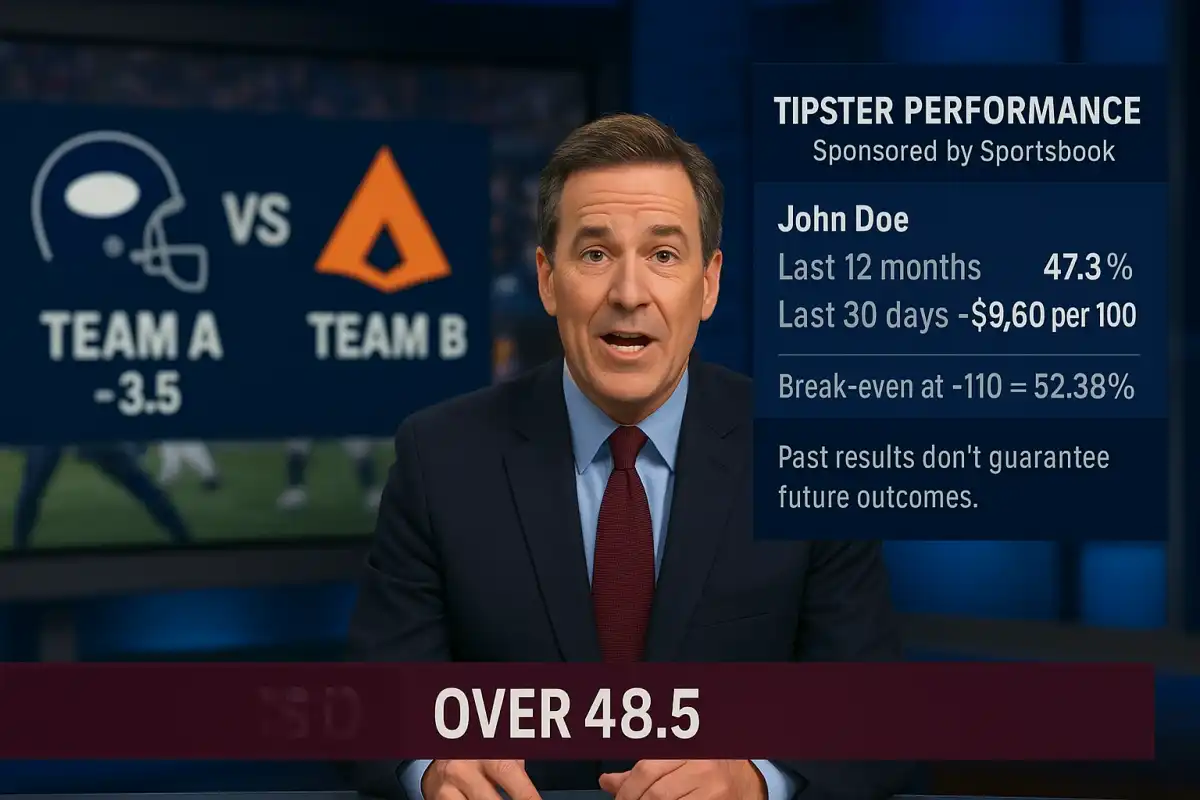
Sports Betting Ads Need a 'Fair Balance' Rule — Here's How That Could Work
You can't watch a major sports game anymore without someone telling you how to bet on it. DraftKings, FanDuel, and other sportsbooks flood TV and streaming platforms with bright, fast-talking ads. They feature analysts and celebrities saying things like:
“The over/under is 42 right now — I'd take the over.”
It sounds confident, even expert. But here's the problem: No one ever tells you how often those “experts” are actually right.
There's no win percentage, no historical accuracy, no disclosure that the person recommending the bet might be paid by the sportsbook itself. The advice feels authoritative, but it's often a sales pitch wrapped in casual conversation. That disconnect doesn't make the ads outright false, but it does make them imbalanced — and that imbalance matters.
The Comparison: Betting vs. Pharmaceuticals
If a pharmaceutical company runs an ad about a new drug, it's legally required to provide “fair balance.” That means any mention of benefits must be accompanied by the side effects and risks. The idea is simple: don't sell hope without the context.
Sports betting ads, though, play by a looser set of rules. Yes, they flash disclaimers about age limits and gambling addiction helplines — usually in tiny print or rapid-fire audio at the end — but they don't have to disclose any of the real-world risks of the behavior they promote.
Think about it: if an analyst says “I'd take the over” without revealing that their overall record is 46-54, that's not very different from a doctor on TV saying, “Try this pill, it works great!” without mentioning that it only helps half the people who take it.
Why It Matters
After the 2018 Supreme Court ruling that allowed states to legalize sports betting, the industry exploded. In just a few years, gambling has become embedded in American sports culture. Every break between quarters or innings is a new chance to download, deposit, and place a bet.
Regulators have focused mainly on where ads can appear (no minors, limited targeting, etc.) and how promotions are described (clarifying “bonus bets,” etc.). But there's a blind spot: the perception of expertise.
Without transparent performance metrics:
- Viewers can't tell the difference between a skilled bettor and a paid promoter.
- New gamblers overestimate their chances of winning, thinking they're “following the pros.”
- “Risk-free” bets often turn out to be credit-based promotions, not actual refunds.
Some countries, like the U.K., have already moved toward requiring clearer disclosures and banning celebrity betting endorsements that target young audiences. In the U.S., though, the regulatory framework hasn't caught up.
The Case for “Fair Balance” in Betting Ads
If pharmaceutical ads must show side effects and investment firms must show risk disclaimers, why shouldn't sports betting ads show performance transparency?
When someone publicly recommends a bet — especially during an ad or sponsored segment — they should also disclose:
- Their historical win percentage (e.g., 47.3% over the past year).
- Their average return on investment per $100 bet.
- A simple note: “Past results don't guarantee future outcomes.”
- And whether they're affiliated or compensated by the sportsbook they're promoting.
That single box of context could instantly shift the tone from hype to honesty. It wouldn't stop anyone from betting — it would just make the decision better informed.
Introducing the Gambling Ad Fairness & Transparency Act (GAFTA)
To bring consistency and fairness to the sports betting ad landscape, we could adopt a simple regulatory framework: the Gambling Ad Fairness & Transparency Act (GAFTA).
Here's what it would include.
Purpose
To ensure that gambling advertisements and sponsored content provide accurate, balanced, and transparent information about both odds and expert performance.
Key Provisions
- Tipster Stats: Require disclosure of recent win rate, ROI, and number of bets analyzed.
- Conflict Disclosure: Reveal whether the person giving advice is sponsored or affiliated with the sportsbook.
- Responsible Gambling Reminder: A consistent, legible disclaimer visible for at least four seconds on TV or video.
- Truth in Promotions: Ban misleading terms like “risk-free” unless the offer truly refunds losses in cash.
- Public Registry: A simple online database where verified tipsters register their historical performance.
Example On-Screen Disclosure
John Doe (Sponsored by sportsbook.com) Last 12 months: 47.3% win rate (ROI -$9600 per $100 bet) Break-even rate at -110 odds: 52.38% Past results don't guarantee future outcomes. Bet responsibly. 1-800-GAMBLER.
This kind of transparency would protect consumers, reward honest broadcasters, and increase long-term trust in the sports betting industry.
The Bigger Picture
This isn't about banning gambling ads — it's about modernizing them.
We already demand transparency wherever money and persuasion mix:
- Pharma: must disclose side effects.
- Finance: must disclose risk and past performance.
- Food: must disclose ingredients and nutrition facts.
Sports betting, which involves real financial risk and addictive potential, should play by the same ethical rules. The industry already collects all the relevant data — there's no technical reason not to show it.
Imagine if every betting ad included a small, standardized “truth box.” The public would quickly learn that even professional handicappers hover near 50%, and that the true “house edge” is baked into the odds.
That's informed choice — not censorship.
Closing Thought
Sports betting has become part of everyday entertainment, and that's fine — as long as it's honest. If we're going to flood our screens with lines, odds, and prop bets, we owe viewers something in return: the truth about who's making the picks and how they actually perform.
A fair balance rule won't ruin the fun. It'll just make it fair — for everyone watching, betting, and believing.
After all, if they can show us the odds, they should also show us their odds of being right.
